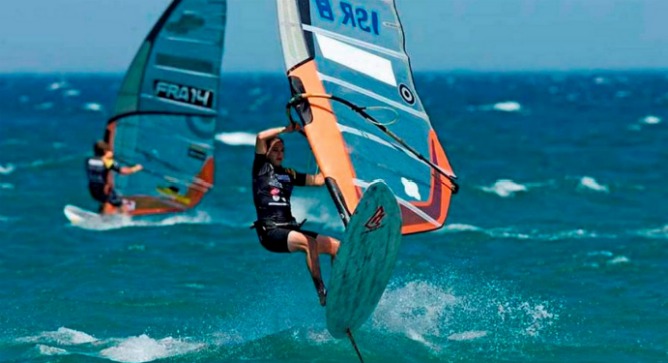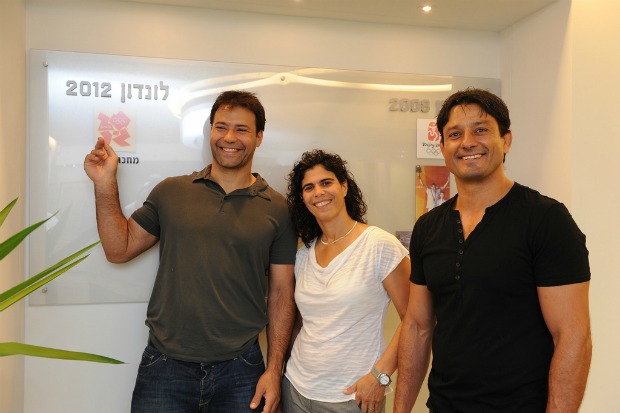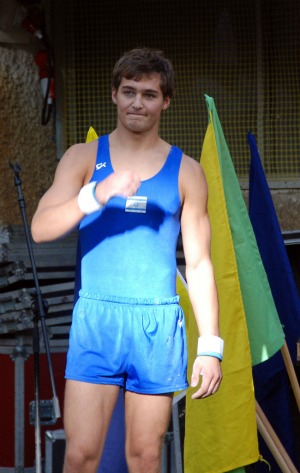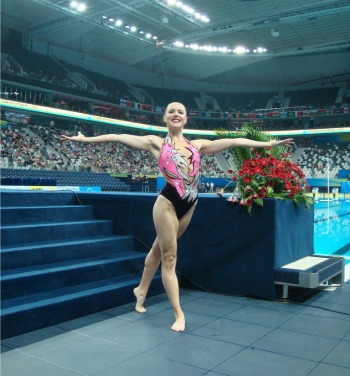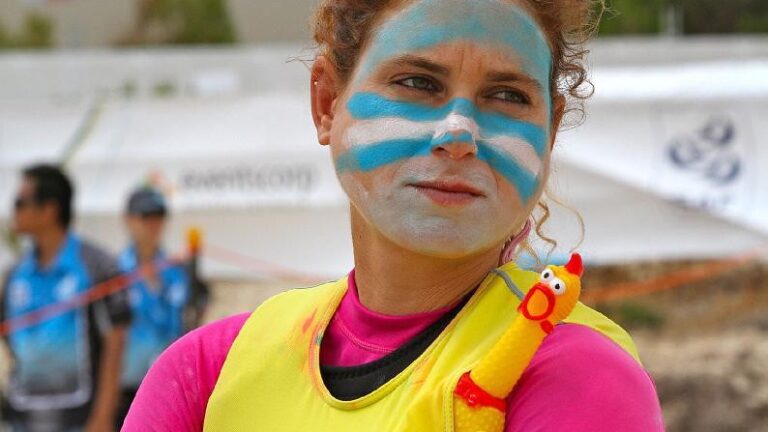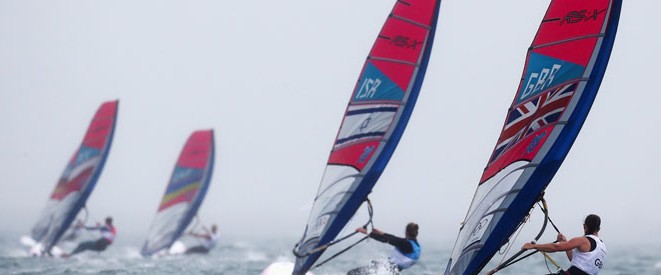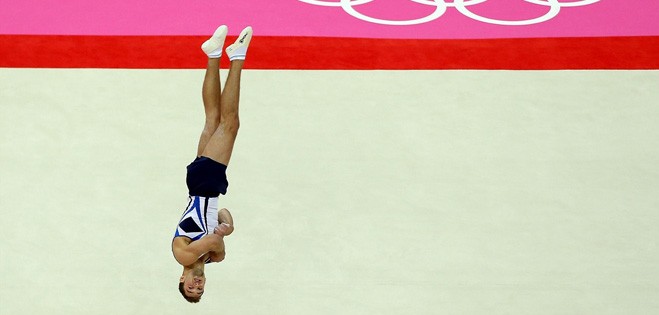Efraim Zinger’s ringtone is ABBA’s “The Winner Takes it All.” A perfect choice for the secretary-general of Israel’s National Olympic Committee.
As Zinger’s crew feverishly gears up for the London Olympic Games from July 27 to August 12, he takes time out to speak with ISRAEL21c about his plans and dreams for the 40 or so athletes who will get to board the plane to London this summer.
“During the last century, since the establishment of the modern Olympics, about 80 countries have never gotten any medal and more than 125 countries never won a gold,” Zinger relates. “We’ve won a few medals and one gold.”
Spread the Word
• Email this article to friends or colleagues
• Share this article on Facebook or Twitter
• Write about and link to this article on your blog
• Local relevancy? Send this article to your local press
To be exact, Israel has won seven medals in 14 Olympic Games since 1952. The first two were awarded at the 1992 Barcelona Games, both in judo: silver for Yael Arad and bronze for Oren Smadja. Since then, Israel has won at least one medal in each Summer Olympics.
“After coming back from each Olympic Games, we spend a year analyzing the Israeli athletes’ performance and making goals and targets for the next delegation,” says Zinger. “By the end of 2009, we had decided on three targets for 2012.”
A new medal category, and maybe for a woman?
The Olympic Committee’s first goal is to return from London for the sixth time in a row with at least one medal for Israel. The second is to see a female Israeli athlete on the winners’ podium.
“At Athens and Beijing, females made up 50 percent of our delegation, and it’s about time to see one of them making another step forward, onto the podium,” says Zinger.
The final goal is to capture a medal in a new discipline. The Jewish state’s two strongest areas are traditionally watercraft sports and judo. Windsurfer Gal Fridman took the gold at Athens in 2004, after winning the bronze in 1996. Michael Kolganov won a bronze for Israel at the 2000 Sydney Games in canoeing.
Israeli judo teammates Ariel (Arik) Zeevi and Alice Schlesinger are widely expected to win medals at London. Zeevi, 35, earned a bronze in 2004 and recently became the oldest European judo champion in history. Schlesinger took the gold in her category at the Moscow Judo Grand Slam on May 26, which was also her 24th birthday.
In windsurfing, Lee Korzits is a top contender.
“We hope to get a medal in sailing, specifically in Class 470 boats,” Zinger says. Shahar Tzubari won the bronze for Israel in the RS:X sailing class at the 2008 Beijing Games, and he’ll be back to try again in 2012.
“We are also hopeful about gymnastics, because we have very good gymnastic teams. Our best chance is Alex Shatilov.”
In the European Championships on May 27, Shatilov won the bronze and received a NIS 25,000 bonus from the Olympic Committee of Israel.
Tennis players Shahar Peer, Andy Ram and Jonathan Erlich; rhythmic gymnast Neta Rivkin, who recently took bronze at the European Championships; sharpshooter Sergey Richter; and sailing superstars Eran Sela and Gidi Kliger also have been mentioned as likely medalists.
Athletes represent a snapshot of Israel
While about 40 athletes have earned a solid place in the Israeli Olympic team, the final list won’t be out until July. “The delegation is formed according to a strict formula from the International Olympic Committee [IOC],” explains Zinger, who will accompany the Israeli athletic delegation for the fifth time in a row. Israeli President Shimon Peres is to lead the delegation.
He describes these competitors as “a group picture” of Israeli society. “You can find men, women, people from big cities and from little towns in the north and south, people born in Israel and people born abroad. This is Israel at its best. The common thing they share is that they are the best in their fields.”
Kosher food will be available at the Olympic Village dining room, which will seat 5,000 and operate on 24-hour basis. The Israelis will stay at the village along with about 16,000 others.
This year carries special poignancy because it marks 40 years since Arab terrorists murdered 11 Israeli Olympic athletes and coaches at the Munich Games. Though the IOC has turned down requests from Zinger and from Deputy Foreign Minister Danny Ayalon to open the London Games with a minute of silence in commemoration of the tragedy, the Israelis will hold a private ceremony that IOC President Jacques Rogge is expected to attend.
Zinger is putting in many hours to ensure the safety and wellbeing of this year’s delegation. And that is a tall order.
“We will be a group of about 80 people, including athletes, coaches, a few sport experts, a press officer, a logistics crew, and a medical team including physicians, physiotherapists and massage therapists,” he says.
“Our professional staff will have to run, simultaneously, 12 world championships since each sport is like a world championship. There are also numerous ceremonies and events, so it’s a huge operation. On a daily basis we must deal with hundreds of small details. And it all has to run smoothly,” he adds with a laugh, “because there are no second chances.”
Faster, higher, stronger
Israel’s temperate climate affords top athletes a certain advantage, says Zinger. “For sports such as sailing, we have the perfect training venue — the Mediterranean — almost 10 months a year.”
However, compared to the other 48 countries that make up the European Olympic Committees (EOC), Israel is at a disadvantage in terms of distance and infrastructure.
“Our athletes, like others around the world, spend a significant number of days per year traveling to training camps and competitions where they meet other athletes,” Zinger explains. “Europeans can drive a few kilometers to train with other national teams at an international training camp, but for us it’s a big operation.”
He is proud that the Israeli Olympic Committee is among three leading members of the EOC for its activities in support of its athletes. “But in other fields, progress needs to be made regarding infrastructure, both physical and human,” he says.
“Getting to the Olympic level is a long road filled with hurdles because of our weakness in the area of sport clubs [and other such groups]. Our second disadvantage is the involvement of the private business sector. In Europe, one can find many businesses working with top athletes under the slogan of ‘The best with the best,’ while here it’s still seen more as a [charitable] contribution.”
Richter, the sharpshooter, took his quest for sponsorship funds to the Internet because the government’s budget for Olympic athletes is so limited.
Nevertheless, Israel’s Olympic athletes will head to London with full expectations of achieving the Olympic motto, “faster, higher, stronger” – or in Hebrew, “maher yoter, gavoa yoter, hazak yoter.”
Preliminary list of Israel’s 2012 Olympic delegation
| Archery | Guy Matzkin |
| Group rhythmic gymnastics | Israel National Team (six gymnasts) |
| Individual rhythmic gymnastics | Neta Rivkin |
| Judo half-heavyweight | Ariel Zeevi |
| Judo half-middleweight | Alice Schlesinger |
| Men’s 10-meter air rifle | Sergey Richter |
| Men’s 50-meter rifle three positions | Sergey Richter |
| Men’s 50-meter rifle prone | Sergey Richter |
| Men’s 100m backstroke | Yakov-Yan Toumarkin |
| Men’s 100m freestyle | Nimrod Shapira Bar-Or |
| Men’s 200m backstroke | Yakov-Yan Toumarkin |
| Men’s 200m butterfly | Gal Nevo |
| Men’s 200m freestyle | Nimrod Shapira Bar-Or |
| Men’s 200m individual medley | Gal Nevo |
| Men’s 400m individual medley | Gal Nevo |
| Men’s badminton singles | Misha Zilberman |
| Men’s individual artistic gymnastics | Alexander Shatilov |
| Men’s marathon | Zohar Zemiro |
| Men’s two-person dinghy 470 | Gideon Kliger and Eran Sela |
| Men’s windsurfing RS:X | Shahar Tzubari |
| Women’s 100m butterfly | Amit Ivry |
| Women’s individual artistic gymnastics | Valeria Maksiuta |
| Women’s one-person dinghy laser radial | Nufar Edelman |
| Women’s pole vault | Jillian Schwartz |
| Women’s synchronized swimming duet | Anastasia Gloushkov, Inna Yoffe |
| Women’s two-person dinghy 470 | Gil Cohen and Vered Buskila |
| Women’s windsurfing RS:X | Lee Korzits |
London 2012 Olympic stats
| 26 sports, 39 disciplines |
| 34 venues |
| 8.8 million tickets |
| 10,490 athletes |
| 302 medal events |
| 21,000 media and broadcasters |
| 19 competition days |
| 2,961 technical officials |
| Table Cell |
| 204 National Olympic Committees |
| 5,770 team officials |
| 5,000 anti-doping samples |
For news, features, videos and background information on the athletes, please visit olympics.israel21c.org.




